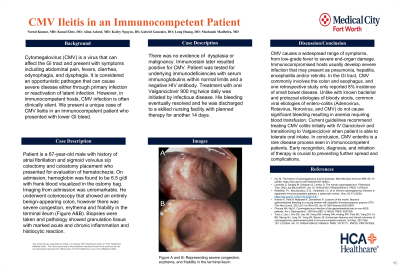Tuesday Poster Session
Category: Small Intestine
P4137 - CMV Ileitis in an Immunocompetent Patient
Tuesday, October 24, 2023
10:30 AM - 4:00 PM PT
Location: Exhibit Hall

Has Audio
- NK
Neetal Kumar, MD
Medical City Fort Worth
Fort Worth, TX
Presenting Author(s)
Neetal Kumar, MD1, Kunal Elete, DO1, Alina Ashraf, MD2, Kailey Nguyen, BS3, Gabriel Gonzales, DO1, Long Hoang, DO1, Machaiah Madhrira, MD1
1Medical City Fort Worth, Fort Worth, TX; 2HCA Medical City Fort Worth, Fort Worth, TX; 3UNTHSC-TCOM, Fort Worth, TX
Introduction: Cytomegalovirus (CMV) is a virus that can affect the GI tract and present with symptoms including abdominal pain, fevers, diarrhea, odynophagia, and dysphagia. It is considered an opportunistic pathogen that can cause severe disease either through primary infection or reactivation of latent infection. However, in immunocompetent hosts, CMV infection is often clinically silent. We present a unique case of CMV ileitis in an immunocompetent patient who presented with lower GI bleed.
Case Description/Methods: Patient is a 67-year-old male with history of atrial fibrillation and sigmoid volvulus s/p colectomy and colostomy placement who presented for evaluation of hematochezia. On admission, hemoglobin was found to be 6.5 g/dl with frank blood visualized in the ostomy bag. Imaging from admission was unremarkable. He underwent colonoscopy that showed an entirely benign-appearing colon, however there was severe congestion, erythema and friability in the terminal ileum. Biopsies were taken and pathology showed granulation tissue with marked acute and chronic inflammation and histiocytic reaction. There was no evidence of dysplasia/malignancy. Immunostain later resulted positive for CMV. Patient was tested for underlying immunodeficiencies with serum immunoglobulins within normal limits and a negative HIV antibody. Treatment with oral Valganciclovir 900 mg twice daily was initiated by infectious disease. His bleeding eventually resolved and he was discharged to a skilled nursing facility with planned therapy for another 14 days.
Discussion: CMV causes a widespread range of symptoms, from low-grade fever to severe end-organ damage. Immunocompromised hosts usually develop severe infection that may present as pneumonia, hepatitis, encephalitis and/or retinitis. In the GI tract, CMV commonly involves the colon and esophagus, and one retrospective study only reported 8% incidence of small bowel disease. Unlike with known bacterial and protozoal etiologies of bloody stools, common viral etiologies of entero-colitis (Adenovirus, Rotavirus, Norovirus, and CMV) do not cause significant bleeding resulting in anemia requiring blood transfusion. Current guidelines recommend treating CMV colitis initially with IV Ganciclovir and transitioning to Valganciclovir when patient is able to tolerate oral intake. In conclusion, CMV enteritis is a rare disease process seen in immunocompetent patients. Early recognition, diagnosis, and initiation of therapy is crucial to preventing further spread and complications.

Disclosures:
Neetal Kumar, MD1, Kunal Elete, DO1, Alina Ashraf, MD2, Kailey Nguyen, BS3, Gabriel Gonzales, DO1, Long Hoang, DO1, Machaiah Madhrira, MD1. P4137 - CMV Ileitis in an Immunocompetent Patient, ACG 2023 Annual Scientific Meeting Abstracts. Vancouver, BC, Canada: American College of Gastroenterology.
1Medical City Fort Worth, Fort Worth, TX; 2HCA Medical City Fort Worth, Fort Worth, TX; 3UNTHSC-TCOM, Fort Worth, TX
Introduction: Cytomegalovirus (CMV) is a virus that can affect the GI tract and present with symptoms including abdominal pain, fevers, diarrhea, odynophagia, and dysphagia. It is considered an opportunistic pathogen that can cause severe disease either through primary infection or reactivation of latent infection. However, in immunocompetent hosts, CMV infection is often clinically silent. We present a unique case of CMV ileitis in an immunocompetent patient who presented with lower GI bleed.
Case Description/Methods: Patient is a 67-year-old male with history of atrial fibrillation and sigmoid volvulus s/p colectomy and colostomy placement who presented for evaluation of hematochezia. On admission, hemoglobin was found to be 6.5 g/dl with frank blood visualized in the ostomy bag. Imaging from admission was unremarkable. He underwent colonoscopy that showed an entirely benign-appearing colon, however there was severe congestion, erythema and friability in the terminal ileum. Biopsies were taken and pathology showed granulation tissue with marked acute and chronic inflammation and histiocytic reaction. There was no evidence of dysplasia/malignancy. Immunostain later resulted positive for CMV. Patient was tested for underlying immunodeficiencies with serum immunoglobulins within normal limits and a negative HIV antibody. Treatment with oral Valganciclovir 900 mg twice daily was initiated by infectious disease. His bleeding eventually resolved and he was discharged to a skilled nursing facility with planned therapy for another 14 days.
Discussion: CMV causes a widespread range of symptoms, from low-grade fever to severe end-organ damage. Immunocompromised hosts usually develop severe infection that may present as pneumonia, hepatitis, encephalitis and/or retinitis. In the GI tract, CMV commonly involves the colon and esophagus, and one retrospective study only reported 8% incidence of small bowel disease. Unlike with known bacterial and protozoal etiologies of bloody stools, common viral etiologies of entero-colitis (Adenovirus, Rotavirus, Norovirus, and CMV) do not cause significant bleeding resulting in anemia requiring blood transfusion. Current guidelines recommend treating CMV colitis initially with IV Ganciclovir and transitioning to Valganciclovir when patient is able to tolerate oral intake. In conclusion, CMV enteritis is a rare disease process seen in immunocompetent patients. Early recognition, diagnosis, and initiation of therapy is crucial to preventing further spread and complications.

Figure: Endoscopic images of the terminal ileum demonstrating inflammation with erythematous and friable mucosa.
Disclosures:
Neetal Kumar indicated no relevant financial relationships.
Kunal Elete indicated no relevant financial relationships.
Alina Ashraf indicated no relevant financial relationships.
Kailey Nguyen indicated no relevant financial relationships.
Gabriel Gonzales indicated no relevant financial relationships.
Long Hoang indicated no relevant financial relationships.
Machaiah Madhrira indicated no relevant financial relationships.
Neetal Kumar, MD1, Kunal Elete, DO1, Alina Ashraf, MD2, Kailey Nguyen, BS3, Gabriel Gonzales, DO1, Long Hoang, DO1, Machaiah Madhrira, MD1. P4137 - CMV Ileitis in an Immunocompetent Patient, ACG 2023 Annual Scientific Meeting Abstracts. Vancouver, BC, Canada: American College of Gastroenterology.
